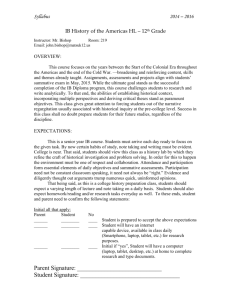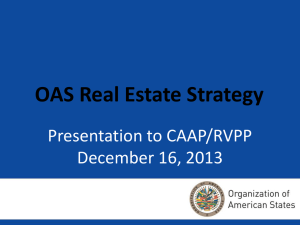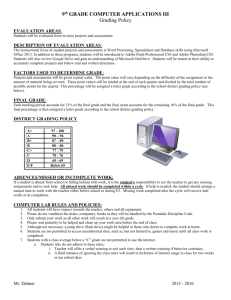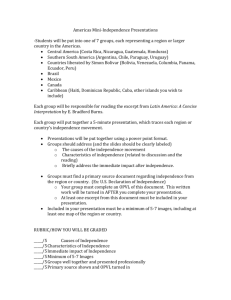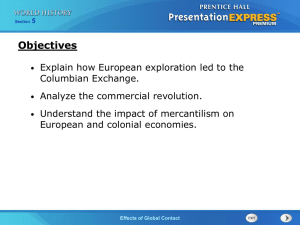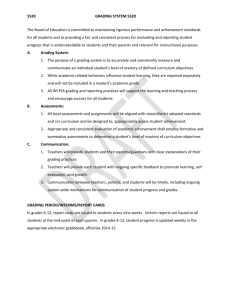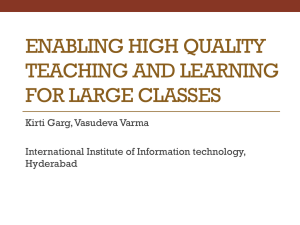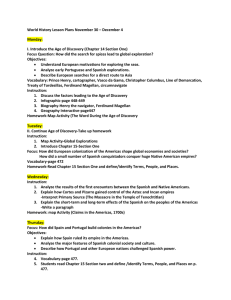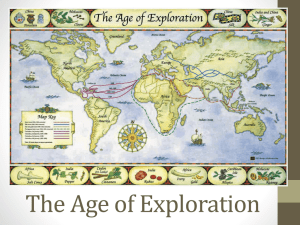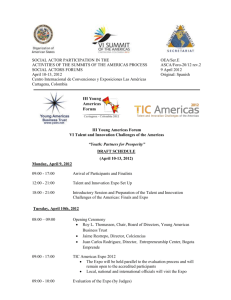Syllabus
advertisement
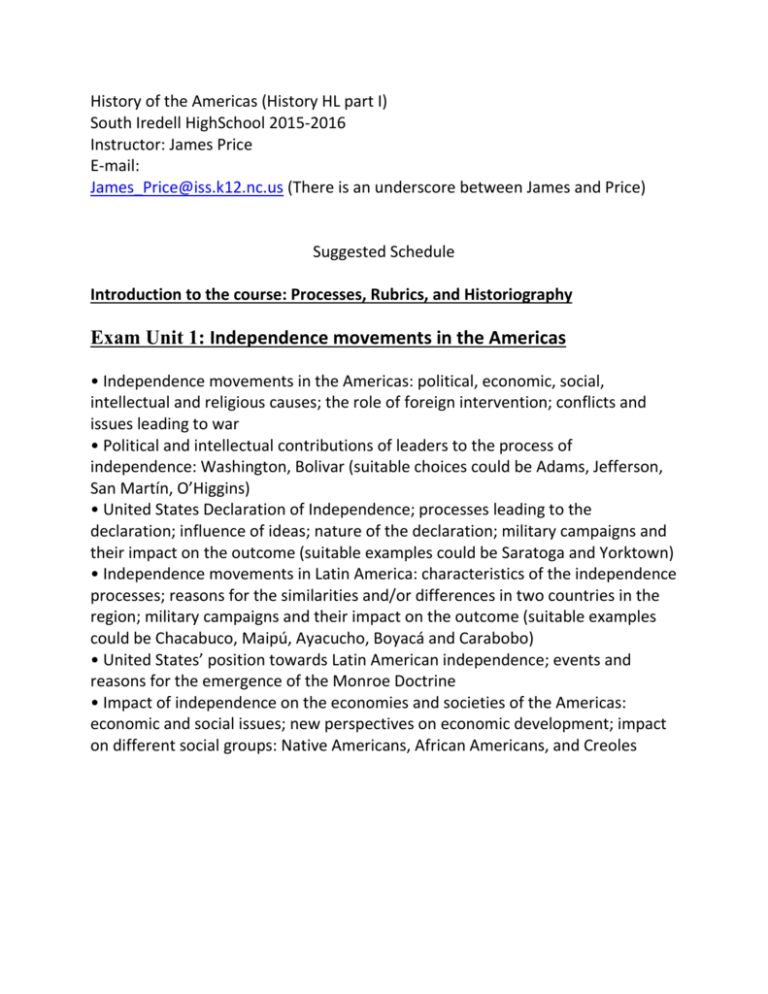
History of the Americas (History HL part I) South Iredell HighSchool 2015-2016 Instructor: James Price E-mail: James_Price@iss.k12.nc.us (There is an underscore between James and Price) Suggested Schedule Introduction to the course: Processes, Rubrics, and Historiography Exam Unit 1: Independence movements in the Americas • Independence movements in the Americas: political, economic, social, intellectual and religious causes; the role of foreign intervention; conflicts and issues leading to war • Political and intellectual contributions of leaders to the process of independence: Washington, Bolivar (suitable choices could be Adams, Jefferson, San Martín, O’Higgins) • United States Declaration of Independence; processes leading to the declaration; influence of ideas; nature of the declaration; military campaigns and their impact on the outcome (suitable examples could be Saratoga and Yorktown) • Independence movements in Latin America: characteristics of the independence processes; reasons for the similarities and/or differences in two countries in the region; military campaigns and their impact on the outcome (suitable examples could be Chacabuco, Maipú, Ayacucho, Boyacá and Carabobo) • United States’ position towards Latin American independence; events and reasons for the emergence of the Monroe Doctrine • Impact of independence on the economies and societies of the Americas: economic and social issues; new perspectives on economic development; impact on different social groups: Native Americans, African Americans, and Creoles Bridge Unit: Major themes in US History from the early republic through the growth of Consumerism in the 1920’s Monroe Doctrine to Manifest Destiny U.S. Civil War Industrialization to Imperialism Growth of American Consumer Culture Exam Unit 2: The Great Depression and the Americas 1929‑39 • The Great Depression: political and economic causes in the Americas • Nature and efficacy of solutions in the United States: Hoover; Franklin D Roosevelt and the New Deal; critics of the New Deal • Canada: Mackenzie King and RB Bennett • Latin America’s responses to the Depression: either G Vargas or the Concordancia in Argentina; Import Substitution Industrialization (ISI) or any relevant case study of a Latin American country (I would strongly recommend you choose to include Vargas in Brazil and their approach to ISI). • Impact of the Great Depression on society: African Americans, women, minorities • The Great Depression and the arts: photography, the movie industry, the radio, literary currents Exam Unit Three: The Second World War and the Americas 1933‑45 • Hemispheric reactions to the events in Europe: inter-American diplomacy; cooperation and neutrality; Franklin D Roosevelt’s Good Neighbor policy, its application and effects • The diplomatic and/or military role of two countries in the Second World War • Social impact of the Second World War on: African Americans, Native Americans, women and minorities; conscription • Treatment of Japanese Americans and Japanese Canadians • Reaction to the Holocaust in the Americas • Impact of technological developments and the beginning of the atomic age • Economic and diplomatic effects of the Second World War in one country of the Americas Treatment of minorities Course Closeout: Preliminary Internal Assessment Procedures Draft Production Preliminary Scores Basic Classroom Procedures and Expectations Homework: The standing homework assignment for this class will be to make sure that you have read any background information necessary to engage in intelligent and relevant discussion of the current topic being explored. Readings will include assigned chapters from the textbook as well as any other documents that need to be reviewed prior to the following class. Students will also take notes regularly on the major people and events associated with each unit of study. These notes will be taken with standards F and G in mind and will be submitted three times in each grading period. These will be unannounced note checks, so students must keep up with notes! Grading: All grading in this course will be done using Standards Based Grading trended with three data points. Within the first week of a standard being assessed, a rubric will be distributed to the class to ensure complete understanding of the items being assessed. Each standard being addressed in a given grading period must be assessed at least three times. Be careful, the following will result in a grade of non-scorable for any assessment: 1. No name 2. Not printed(if a printed copy is required) 3. Not including period and block 4. Not addressing ALL parts of the given prompt 5. Single-spaced 6. Any plagiarism, including using text without citing source Class Engagement and Participation: History HL in the Diploma Programme is a two-year course consisting of History of the America’s and Topics in 20th Century History. Unlike the Humanities courses taken in MYP, the only summative assessments taken for both years, which factor into the calculations for the IB Diploma occurs at the end of senior year. In preparation for these three exams, students will be required to not only master a significant amount of content, but be able to demonstrate the ability think critically about the content; compare and contrast individuals, events, and ideas; and demonstrate cause and effect. This reality will require students to be consistently engaged in all classroom activities. Although trend-grading allows students to opt-out of assessments, this does not mean that students can opt-out of classroom activities. It will be virtually impossible to achieve a passing score on the external assessments if students are habitually engaging in non-classroom activities throughout the two-year course! Most in-class activities will be submitted for a grade using the Standard E rubric. Cheating/Plagiarism: Cheating and plagiarism on assessments will not be tolerated. Any suspected violation of this policy will immediately be reported to Mrs. Moyer, the Diploma Programme Coordinator, and she will assign any penalties deemed necessary above the assessment receiving the grade of NS (non-scorable)which will be enforced by the instructor. If you choose to engage in plagiarism you are cheating yourself of any chance to score well on your external assessments and earn the IB Diploma! IB Internal assessment: See HOA Subject Guide located on the Student Resources page of my staff website (completed throughout Junior Year). IB External assessments: See HOA Subject Guide located on the Student Resources page of my staff website (completed at end of Senior Year).
